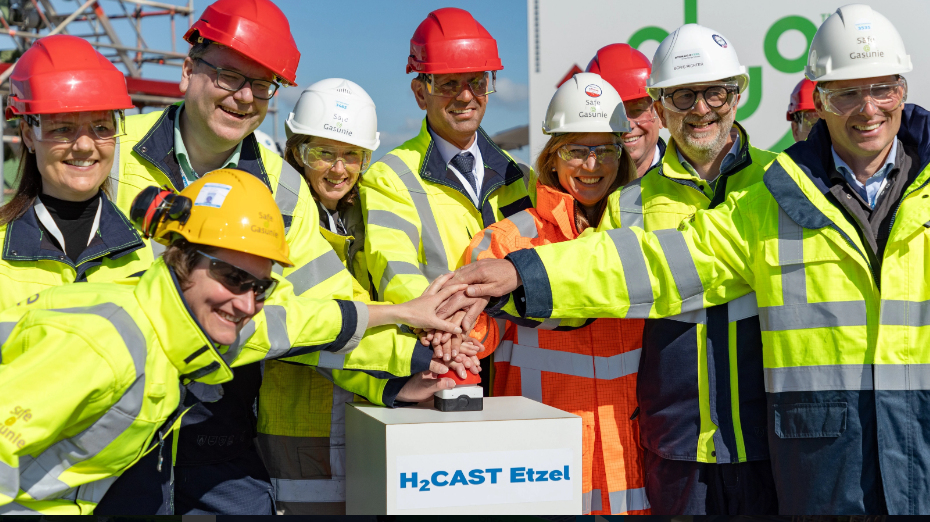
The project’s first phase, “H2CAST Ready”, saw the caverns filled with hydrogen to demonstrate their suitability for use as underground hydrogen storage facilities and the impermeability of the materials installed underground.
The project is now continuing on schedule with the start of work on the surface facility. This is the “H2CAST Prove” phase, which will demonstrate that the facilities are operating as intended and that they guarantee the desired hydrogen quality.
On 9 May 2025, the project initiators Marc van der Linden, Gasunie Business Development Director, and Boris Richter, Managing Director of Storag Etzel, ceremonially launched the works, together with Hester Somsen, Ambassador of the Kingdom of the Netherlands to Germany, Christian Meyer, Lower Saxony’s Minister for the Environment, Energy and Climate Protection, and Olaf Lies, Lower Saxony’s Minister for Economic Affairs, Transport, Construction and Digitalization.
The first deliveries of renewable hydrogen on behalf of Gasunie have now started and are being implemented by the service provider Plug Power from a production facility in Werlte, Germany, just 90 kilometres south of the Etzel storage facility. A total of around 90 tons of hydrogen will be injected into the two project caverns.
Marc van der Linden, Business Development Director of Gasunie, said, “Hydrogen will play an important role in the future energy system, especially in making industry more sustainable. Large-scale hydrogen storage is crucial for an efficiently functioning hydrogen market. For Gasunie, these milestones are the next step in its ambition to develop hydrogen storage capacity in order to help ensure a smooth start of the hydrogen market in the Netherlands and Germany.”
In the Netherlands, Gasunie has now started developing underground hydrogen storage facilities in the northern part of the country (HyStock). In the German village of Etzel, Gasunie and Storag Etzel have been working together since 2023 on the H2CAST pilot project, which is a trial to prove the feasibility of storing hydrogen in two existing, immense caverns with a geometric volume of around 300,000 cubic meters. The aim is to develop and operate a flexible underground storage facility with a total capacity of up to 1TWh of hydrogen.
The location of the cavern storage facility in Etzel is strategically favourable with a perfect connection route to the German-Dutch hydrogen market, in close proximity to the future hydrogen core network and the Energy Hub in Wilhelmshaven.
Boris Richter, Manger of STORAG ETZEL, said, “The H2CAST project will generate important information as a blueprint for the conversion of further caverns for hydrogen storage in Germany and help us gain valuable operating experience in this area. The Etzel site already operates as an energy hub with an existing connection to the European natural gas grid. Etzel is also located in the immediate vicinity of Germany’s only deep-water port in Wilhelmshaven. This port has H2-capable pipeline connections and will also play an important role in the H2 core network for hydrogen imports in the future."

